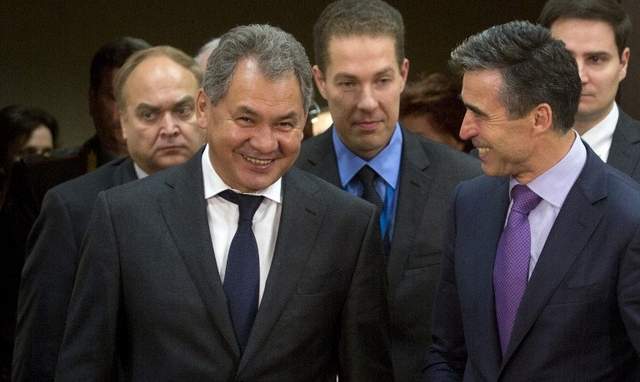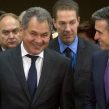
Shoigu Agrees to Maintain a Videolink to the Pentagon
Publication: Eurasia Daily Monitor Volume: 10 Issue: 190
By:

This week, officials of the North Atlantic Treaty Organization (NATO) were anticipating Russian Defense Minister Sergei Shoigu’s first appearance at a NATO-Russia Council (NRC) defense ministerial. The NRC had not met at this level in almost two years, as relations between Russia and the Alliance floundered. Just prior to the ministerial, an anonymous top NATO official told Jamestown that Russia’s permanent mission to NATO headquarters in Brussels had been cautiously indicating that Shoigu would be coming to the NRC with some fresh ideas regarding plans for future cooperation. Meanwhile, the Russian permanent representative at NATO headquarters, Alexander Grushko, told journalists before Shoigu’s visit that cooperation with the North Atlantic Alliance may help Russia modernize its defense industry, acquire Western know-how in different fields and help make Russian-made defense products “NATO-compatible and competitive” (https://ria.ru/defense_safety/20131022/971669162.html#ixzz2iRUv5wpL).
On the face of it, Shoigu’s actual appearance in Brussels turned into something of an anticlimax. According to NATO officials, speaking to Jamestown on condition of anonymity, Shoigu read out his speech using an approved text that was dull and hardly contained anything new. Later, Shoigu gave a short press conference before speeding back to Russia, and again was reading out a prepared statement. His remarks were followed by questions that were (in the Russian style) allowed only from his personal pool of journalists, who had flown in to Brussels on the same plane with the minister and also accompanied him back to Moscow. The texts of the allowed questions were (Russian style) approved in advance by Shoigu’s press service. There were no surprises; but according to Shoigu, an agreement was reached to continue NATO-Russian cooperation on Afghanistan in 2014, which will include procuring Russian-made helicopters and the training in Russia of Afghan technical staff to maintain those helicopters—all to be financed by a joint NATO financial trust. A pilot project is also going ahead for NATO to provide technical assistance to safely dispose of old Russian conventional munitions in the Kaliningrad region. Previously the Russian military destroyed millions of tons of old munitions left over after the Cold War by exploding them, which caused pollution and sometimes deadly accidents. Now the blowing-up process has been forbidden by law, but there are still lots of old munitions awaiting destruction, so Western help is appreciated (https://www.kommersant.ru/doc/2325780).
Speaking at Alliance headquarters on October 23, Shoigu reiterated Moscow’s opposition to NATO and the United States moving ahead with their plans to build a Ballistic Missile Defense (BMD) system in Europe: “Russian concerns are pushed aside, while the deployment of BMD is happening. There must be some progress on BMD to calm Russian fears that the system will eventually threaten Russian inter-continental missiles [in order] to restore mutual confidence and move forward.” At a press conference at NATO headquarters held that same day, US Secretary of Defense Chuck Hagel confirmed that Russian-Western differences over BMD continue, but he noted that next month there will be a planned groundbreaking ceremony on the future US BMD site in Romania. Moreover, hinting at possible grounds for optimism, Hagel alone revealed to journalists that, at a bilateral meeting on the sidelines of the NATO-Russia Council, he and Shoigu agreed “to have regular videoconferences to increase military-to-military cooperation.” The US Defense Secretary conceded, however, that the actual regularity of those “regular” videoconferences has not yet been decided, nor has their actual agenda (Author’s notes from NRC defense ministerial, October 23).
Shoigu is well known in Russia for being very fond of videoconferences. Responding to a question from Jamestown, Hagel stressed he also uses videoconferences. Moreover, he noted that the idea to connect the Pentagon via videolink to the Ministry of Defense in Moscow was discussed last August during the so-called 2+2 talks in Washington of Russian Foreign Minister Sergei Lavrov and Shoigu with their US counterparts, Secretary of State John Kerry and Hagel. “Now we [Hagel and Shoigu] decided to follow up on the idea we had, after having a preliminary meeting between the two of us, to connect using a videolink,” Hagel told Jamestown, adding, “Now is the right time to have an informal way to communicate on a wide scope of questions.” The US Secretary of Defense seems to believe that having a regular direct, informal link to Shoigu could help to “frankly” single out areas of disagreement and move forward on others where progress is possible.
Moscow and Washington are jointly supporting the international effort to destroy Syria’s chemical weapons, and US officials have expressed hope that this newly found common ground may help mend the two countries’ damaged relations. Hagel seemed inspired by the prospect of future videoconferences with the Russian defense minister, apparently hoping to cut through dead layers of Moscow’s Soviet-style bureaucracy and find a direct connection with Shoigu—a popular political figure in Russia, known for his pragmatism and energy. Shoigu, in turn, has his own agenda that requires seeking areas of cooperation with the West. Speaking in Brussels, Shoigu told journalists, “Russia is building modern and capable armed forces that will be ready to repel any threat,” but assured his audience that this build-up does not threaten NATO (https://www.newsru.com/world/23oct2013/shoigu_nato.html).
As economic growth grinds to a standstill in Russia, the government is presenting to the Duma an austere budget with cuts in social expenditure and many other fields, but defense spending will continue to grow. According to Shoigu, “In the defense budget for 2014 and in spending plans for 2015–2016 there will be no cuts; the development and the modernization of the Armed Forces, [as well as] the procurement of weapons will continue as planned.” There were serious arguments in the government, Shoigu added, “but the commander-in-chief [President Vladimir Putin] made the decision” (Interfax, October 19).
The daunting task of rearming and modernizing Russia’s mothballed military remains a top priority, but finding money in a time of economic stagnation and financial austerity is not enough. Russia needs Western-made or designed high-tech components, special materials and know-how to ensure the domestic defense industry is indeed capable of producing the required merchandise (see EDM, October 11, 2012). Today, as many times in the past, Russia is attempting to modernize its ailing military—and it surely needs Western help. The Russian defense minister may be hesitant, at present, to forge too close a relationship with NATO as a collective alliance because Moscow has traditionally preferred to deal with Western countries on an individual basis. Still, Shoigu has a serious incentive to make the planned videolink with Hagel a reality with tangible results.




